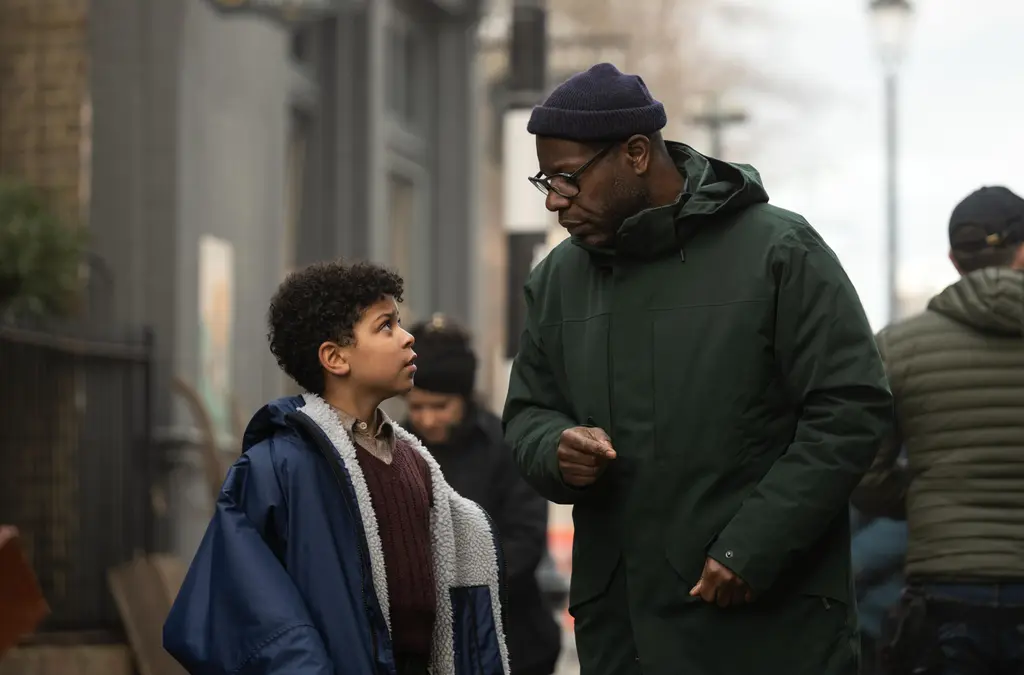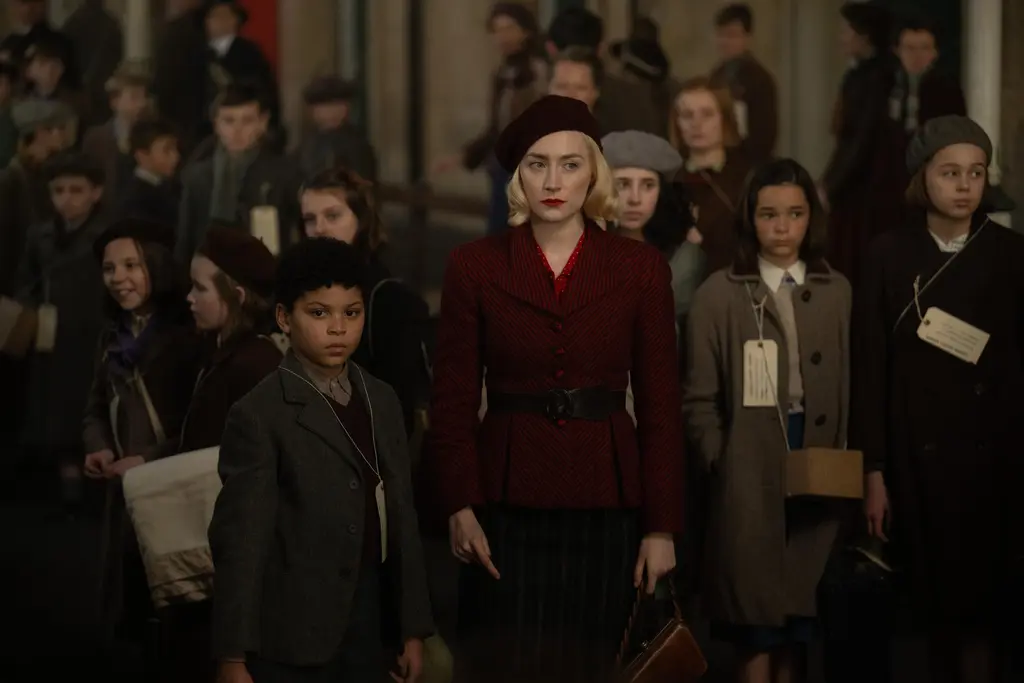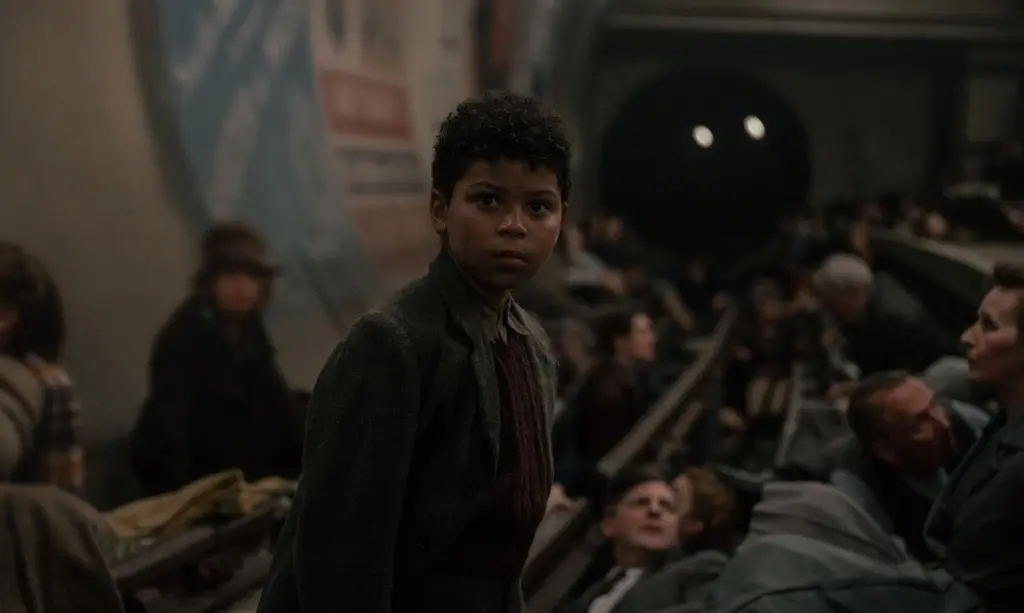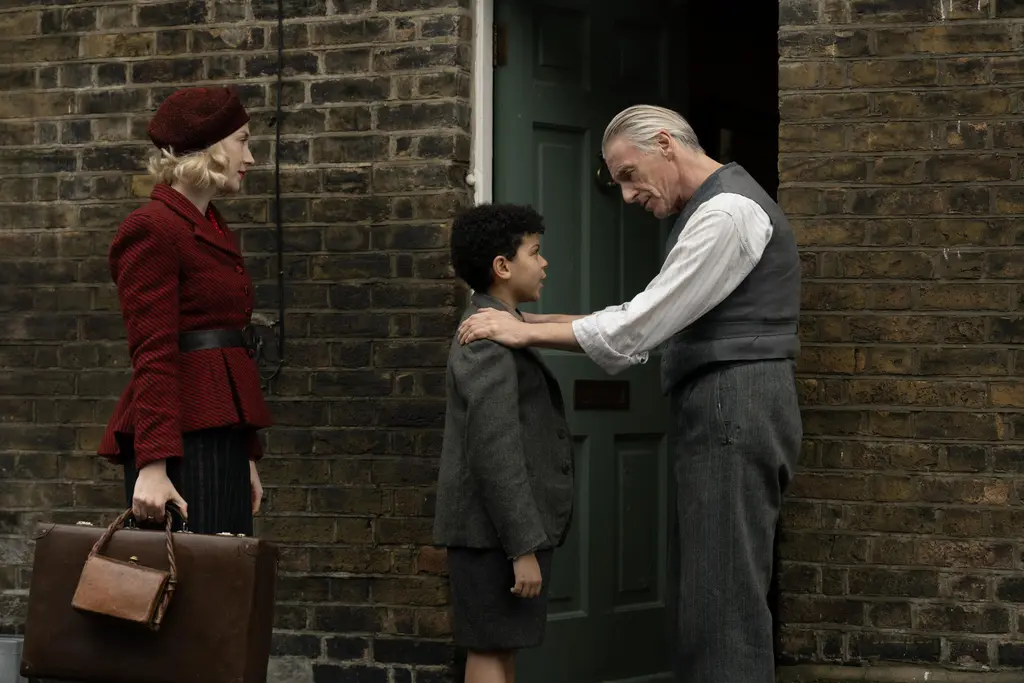The Blitz Kids: inside Steve McQueen’s WW2 epic

London Film Festival: Blitz is this year’s Opening Night Gala. Its director and young stars discuss presenting a new, diverse view of life in bomb-shattered London.
Culture
Words: Craig McLean
It’s Saturday night at the Café de Paris in Leicester Square, in the heart of London. The house band, led by British-Guianese musician and dancer Ken “Snakehips” Johnson, are midway through a performance of jazz-era favourite Oh Johnny. The champagne and good energy are flowing. Then a bomb falls through the roof, explodes at the edge of the balcony and kills 34 clubgoers.
These are the true events of 8th March 1941 depicted in Blitz, the powerful World War II drama from writer-director Steve McQueen (Small Axe) that’s the Opening Night Gala at this year’s London Film Festival. With the dust still settling, rescuers are quickly on the scene – but so are looters.
Led by Stephen Graham’s Albert and Kathy Burke’s Beryl, they swarm over the well-dressed dead, picking them clean of finery and jewellery – even cutting off fingers to access their rings. That, too, is true. As Graham puts it: “Steve shines a light on the darker side. When he told me that the looting was based on truth, I really couldn’t believe it. In their mind, the people are dead and nothing’s going to happen with it, so why not take it? But, on the other hand, it gives an insight into the more sinister things that were going on.”
Expanding on that at a press conference at London’s National Film Theatre this afternoon ahead of tonight’s world premiere of Blitz, Graham pointed out the other “disgusting” element of that scene: “You have people of high society sitting there sipping champagne and eating foie gras… yet there’s people dying and bombs going off. So to show that extreme, I think that’s just as disgusting as my people trying to survive, taking the jewellery off the dead.”
Forcibly recruited to the gang is nine-year-old George, played by newcomer Elliot Heffernan. He’s the only child of single mother Rita (Saoirse Ronan), and the grandson of working class, piano-playing East End geezer Gerald (played, creditably, in his first big screen role, by Paul Weller).
As McQueen – a proud Londoner for whom opening this London-set film at LFF, rather than any other international film festival, was of prime importance – said at the press conference, in terms of foregrounding a kid in the director’s take on a war film: “I want to see the world through his eyes.”
Like 1.25 million other people during World War II, mostly mothers and children, George has been sent away to the countryside as an evacuee from the city. “I knew about the Blitz, the bombing of London and people being evacuated, which is a bit sad,” says Heffernan, who was nine when he shot the film last year. “Some kids would go and never come back, never seeing their parents again. Being a parent must have been heartbreaking, knowing there was a chance you might not see your child again.”
So, missing his mum too much, plucky young George jumps from the train outside London and proceeds to try to make his way, in a Dickens-meets-Disney picaresque, back across the bombed-out city. Now he’s a kid lost and alone in the midst of the near-nightly, eight-month bombardment by the Luftwaffe (German air force) of London in the early years of the war, and he’s been groomed into the vicious, dead-robbing gang of criminals by Albert’s teenage daughter Jess.
“She’s 18, very rough and tough whilst also vulnerable,” Mica Ricketts, who plays Jess, tells us. “She lives under strict rules by her unstable and problematic father. While it’s clear to see her relationship with her family is a difficult one, she has an undeniable loyalty to them. Jess has been brought up to be a survivor and to do whatever is necessary for her and her family, whether that’s good or bad.” Hence her entering the narrative “under the pretence of helping the young boy after she finds him. Things quickly turn sour when her family comes into play.”
Then there’s Harris Dickinson’s Jack, a young firefighter. In Blitz’s opening scenes, we’re plunged straight into the inferno, Jack and his colleagues tackling a huge blaze set off by Luftwaffe incendiary bombs. It’s a tough, terrifying start, one also as true as possible to what it was like on the ground.
“Everything you handle in the Fire Brigade is both heavy and unmanageable and seems to have a malignant life of its own,” said one wartime firefighter, quoted as part of the deep background research from historical advisor Joshua Levine, author of The Secret History of the Blitz, that McQueen drew upon. “Even when you are holding the branch [nozzle] its principal aim seems to be to wrench itself free, and should you lose your grip for a moment, it will lash out at you like an enraged, brazen-headed snake, split your skull open or break your arm.”


Doing his own research, Dickinson, 28, realised how young those firefighters were – and, often, ill-prepared. “Reading and listening to accounts of that and trying to understand the human level was really interesting to me. They were ordinary people put into these extraordinary situations. Steve somehow manages to balance this huge world whilst also keeping everything contained and intimate, which is not easy. He encouraged me to find things that gave life to Jack beyond the film. The fact that he is a young man and seeing death on a daily basis would bring a quiet torment to anyone.”
These are the Blitz kids: the young talent at the heart of McQueen’s film. It’s named after the British press’s word for Hitler’s punishing waves of bombing raids on the UK’s industrial cities early in the war, part of his blitzkrieg – the “lightning war” with which the Nazis aimed to crush all of Europe as quickly and brutally as possible.
But it’s a World War II drama that will make you rethink what you know about traditional, dad-friendly cinematic depictions of the conflict. For one thing, this is the war on the domestic front. Weller, at 66, is old enough to have close experience of that. He remembers his dad telling him how one night, when the air-raid siren went off, their family rushed to their air-raid shelter. “When they came out in the morning, the whole street had been flattened,” says Weller. “My mum was evacuated as a child during the war. I, myself, was only born 13 years after the war ended. For those of that generation, it’s still so fresh in the mind.”
It was these stories that drew Ronan, 30, currently also to be seen on the big screen in The Outrun, the adaptation of Amy Liptrot’s best-selling, beloved memoir. As the four-time Oscar-nominated actor, who very much didn’t want to be involved in just another war film, says: “If it was going to be on a battlefield, and there was going to be a quick cut back to the mothers and wives, that was never something I was going to be interested in doing.”


But this film, as she said this afternoon, gave voice to women like Rita, a single mother and also a munitions worker, who were “the core power within their homes… [And] to step into the roles of men when they left [to fight] was I’m sure incredibly trying for these young women who were in their twenties. So much was being expected of them. That change that happened culturally, that shift, was so seismic. For myself and the other actors [playing factory workers] like Hayley Squires and Erin [Kellyman] and Sally [Messham], for all of us to know what was going to happen but to keep in the present was an incredibly exciting part of the story to bring to life. Because we knew how pivotal this moment was in history for us.”
More broadly, “what’s special about the film is that it’s highlighting the sacrifice that was made by those who stayed. To have a film that focuses on those communities is really important.”
Those communities are the other key point of difference in McQueen’s depiction of the home front during World War II.
“I first started thinking about making a film about the Blitz in the early 2000s,” he says in his Director’s Statement. “It was constantly on my mind, but it was only when I discovered a photograph while researching my anthology film series Small Axe that I finally found a way in. It was an image of a small Black boy standing on a train platform with a large suitcase. That image stayed with me in an almost omnipresent ghostly way, and I continued to find myself wondering who this child was, what was his story during the Blitz?
“My work with London’s Imperial War Museum in my capacity as official War Artist for Iraq in 2003 – a role which also drew me to first-hand accounts of war – led me to uncover even more valuable material from the time,” McQueen writes, “and discover the diversity of London during the Blitz.”
Sadly unsurprisingly, biracial George’s experiences of racism are another trial he has to endure as he picks his way home through the rubble. One of the reasons he trusts Jess is because she looks like him.
“Personally, I have never seen such an integrated version of 1940s London as is portrayed in the film,” says Ricketts. “This is what drew me in from the get-go. I believe it is so accurate and shows a truer representation of Black people and how present we were in this time.”
Another of the key people George encounters is Ife, a Nigerian air-raid warden. He’s played, in his brilliant big-screen debut, by Mercury Music Prize-winning musician Benjamine Clémentine. As McQueen explains: “I read about this Nigerian lawyer, Ita Ekpenyon, who arrived in the UK in the 1930s and was later recruited to be an air-raid warden. Digging out these stories was very interesting, and I didn’t have to dig that deep to show how diverse London was.”
“Who could ever imagine a rock star like [Paul Weller] playing your dad? He’s the kindest, most down-to-earth person, and he really committed to the role”
SAOIRSE RONAN
“Steve and Joshua told me about Ita’s story and how poignant it is for a lot of people who look like me,” says Clémentine. “He epitomised what it meant to be brave, because he was always putting himself last. He stood for love, life, compassion and respect. He knew the purpose of love and the importance of togetherness. I believe he wanted to build that in London.”
In terms of identity and parenthood, Clémentine’s Ife is a key figure for young George, whose Black seaman dad endured violent racism and was driven from the UK, seemingly before George was born. “It is very difficult to accept who we are because we always believe we are something but ourselves,” says the musician-turned-actor. “For George to accept himself and say to Ife ‘I am Black’ is incredible. I wish I could have said that when I was his age. As a father, I am constantly thinking about how I am going to tell my son and educate him about this. Seeing George in that moment, I saw my son.”
Then, of course, for older readers and viewers, there’s the novelty of seeing Paul Weller dressed up in 1940s clobber and tinkling out music-hall tunes.
“Having Paul play my father was surreal,” says Ronan. “Who could ever imagine a rock star like him playing your dad? He’s the kindest, most down-to-earth person, and he really committed to the role. Even though Paul hadn’t acted before, he was so humble and open to learning. I absolutely loved spending time with him – he’s truly a special person.”
“I’ve never considered acting, or even thought I’d be able to do it,” Weller admits. “But the fact that it was Steve sold it for me. I love his work and, if nothing else, I just wanted to hear what he had to say.”
Indeed: with his new film, one of our most incisive filmmakers has found multiple new ways to say fresh things about a period in history we probably thought we knew more than enough about.
So, go see Blitz. Right now, after all, with bombs raining down in multiple parts of the world, is a time when the “Blitz spirit”, what McQueen characterises as a “communal resilience, when people came together with the shared primal purpose of survival”, has never been more needed. As the filmmaker said this afternoon: “Unfortunately this movie couldn’t have come at a better time.”
Blitz opens the LFF tonight, and also screens on Thursday 10th, Friday 11th and Friday 18th. It’s in cinemas from 1st November, and on Apple TV+ from 22nd November





